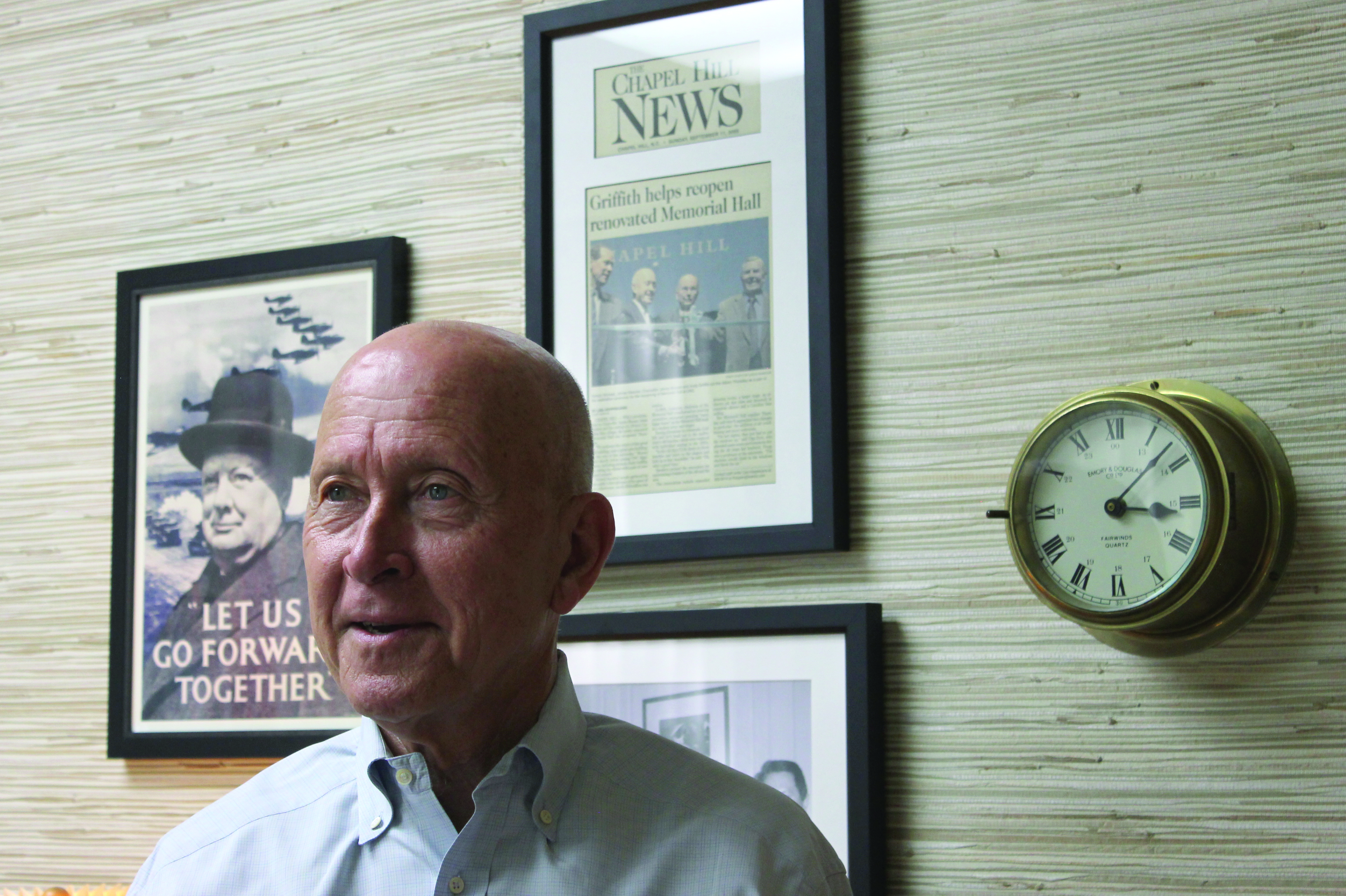Jim Heavner is a grandfather, a businessman and a journalist of over 50 years, but he swears he’s as young as when he first walked into the radio business as a high school student.
He has worked at WCHL — the radio station he owns — almost his whole life. He remembers his time as a young reporter at the Chapel Hill station, scurrying around the newsroom, able to avoid showing WCHL founder Sandy McClamroch how little he really knew about how to run a radio station. After all, McClamroch was very occupied with his other job as mayor.
One day, McClamroch asked Heavner to become a partial owner of the station. They had quite a run together, and Heavner would grow a small empire, controlling a large chunk of Chapel Hill’s media landscape: Nine radio stations.
But as time wore on, Heavner wore down. He has been attempting to unwind the radio station for a while now. In the early 1990s, deals were made. A new leader, Don Curtis, stepped in to replace Heavner for about a decade. But the station became delocalized and things fell apart, and in 2002, Heavner put WCHL back on the air, restaffing the radio station and making it local again.
Now, after WCHL’s parent company, University Directories, has passed a year in bankruptcy court, the station and its affiliate news site, Chapelboro.com, will change hands to a new owner, Leslie Rudd, a Kansas-based investor. In the midst of radio mayhem, when stations are constantly turning over staff and some are hemorrhaging money, the fate of WCHL is uncertain.
Chapel Hill hopes the small news operation will improve and return to its former glory.
On Oct. 24, 2014, University Directories, a collegiate marketing and media company that includes properties such as WCHL and runs under Heavner’s ownership, filed for Chapter 11 bankruptcy in the U.S. Bankruptcy Court for the Middle District of North Carolina, according to court documents.
University Directories was selling to Eli Global, a Durham-based company run by Greg Lindberg, court documents allege.
“The (buyer) we had chosen had signed a letter of intent and a nondisclosure agreement that prohibited his using the information he gathered for any reason that to certify that what we were representing was true,” Heavner said. “Then, secretly, he went in and bought (University Directories’) bank notes and tried to buy the company for $1,” Heavner said.
“Which is not very nice,” he said. “Our lawsuit is pretty clear — it alleges that’s illegal. It charged him with fraud.”
It was an odd day for Heavner this August when he received notice on the latest news in the bankruptcy saga. He was on his way to Wyoming for vacation because he didn’t think much was happening with the case.
His team had put together a plan to get the company out of bankruptcy court. WCHL wanted to find a suitable buyer, unimpaired.
Later that day, Heavner learned Rudd, whom he calls a “very wealthy man,” was making an offer after having found WCHL on the market.
“We would have gotten out of his way and applauded doing it (had we known),” Heavner said.
Rudd could not be reached for comment.
The publicity on these details was unfortunate, Heavner said.
Heavner’s not allowed to say much more on the bankruptcy case. Typically exuding a sense of vibrancy and openness, he tightens up a bit when pressed for details on the legal battle, stating it’s still in litigation.
He hopes that when Rudd replaces him in October or November, the radio’s legacy will live on. He’s optimistic it will.
Heavner is known for hiring some of the sharpest minds in journalism. Eminent journalists like Charles Kuralt began at WCHL, using the station as a stepping stone. Heavner’s strategy has been to bring as many UNC-Chapel Hill students as possible on board, convincing them WCHL will leverage their careers.
But the model has created a high-turnover business and, in some cases, low morale.
Ran Northam worked at WCHL for two and a half years, leaving last October. The experience, he recalls, was “unique”: A small-town radio station, a shrinking staff. His job as a part-time reporter-turned-news-director meant he was at the station at 5 a.m. to produce the morning show, which ran from 6 a.m. to 9 a.m.
Going into the job, Northam hoped he would be there for awhile. There was so much potential in such a small, community-centric news operation. But the news station’s diminishing staff size and demanding work schedule took its toll. He had no energy outside of work and was putting in what often amounted to 60-hour weeks.

“You were expected to work well beyond a 40-hour work week at a salaried position that did not supplement a 40-hour work week,” he said. “Physically it wasn’t doable.”
When Northam first started work at WCHL, he didn’t have much contact with Heavner. Later on though, Heavner was more present, and the two had weekly meetings where they’d talk about Northam’s work and how he was doing personally.
“Jim was a person who you could never leave the room and not have learned something,” Northam said. “He wanted to influence you in some way, whether you asked for it or not.”
Heavner was inducted into the Chapel Hill-Carrboro Chamber of Commerce Business Hall of Fame in 2013. But when asked what the title meant to him, he’s a little scattered in his response. He credits the visibility of being in the media business as a possible reason for the award. He trails into thoughts and memories of his role in the community.
“When Sandy hired me, he said, ‘You’re going to be part of the community,’” Heavner said.
Perhaps his evasion of expanding upon his achievements as a businessman is because Heavner has always perceived himself as a journalist. He’s the one asking questions at press conferences. He’s a story junkie — just ask his colleagues.

In recent years, his business strategies have played a key role in the fate of the news station he claims to love so much.
WCHL had never flirted with the possibility of a change in ownership prior to the sale to Curtis in the early 1990s. But after Curtis took over, Heavner realized Curtis wasn’t programming the station for the community, and he bought it back.
“There was no local news coverage (under Curtis),” said Bob Woodruff, minority owner of the radio station and an employee of WCHL from 1974 to 1999. “(Curtis) basically had paid music and programming. He didn’t have a news staff to curate local news.”
WCHL exists in an industry ridden by financial turmoil. Northam has stayed in contact with WCHL employees and says from what he’s heard, the station itself has always broken even. Never made money, never lost it.
“It’s always just been there as a community asset,” he said.
Heavner acknowledges that in the past year, with the uncertainty of everything, the radio has struggled more.
Community stations across the nation are dying, despite the value they add.
“It’s important for people to have this information — you need to know what the Town Council, the school board, the government is doing,” said Adam Hochberg, a lecturer at the UNC School of Media and Journalism.“Someone needs to be checking that Obey Creek is not polluted, the power plant on Cameron is not spewing out chemicals.”
The severe ice storm of 2002, Eve Carson’s murder, the Chancellor’s inauguration: The radio station was one source Chapel Hill could rely on in these times of crisis and change.
WCHL has been in the same brick building on Vilcom Center Drive since 1978. Walls clad with photos of the Old Well and UNC basketball victory celebrations, it embodies community journalism.
Some, like Northam, wish WCHL would move to a more central and visible location in the bustling heart of downtown Chapel Hill.
It’s a rare operation, though, and unlike many cities in the area, such as Cary, Chapel Hill has this radio station that churns out highly local news. While the town itself is undergoing a transition in which Sutton’s Drug Store is no longer a drug store and the local paint store is gone, WCHL remains a stand-alone community station.
Its status as such a community-oriented station means the recent news of Rudd’s buyout is the talk of the town. It means there’s a sense of hope in the air that Rudd’s alleged passion for Chapel Hill will revitalize the station.
“If you’re interested in Chapel Hill stories, you’re going to turn on WCHL, and you’re going to hear local stories. I think that’s very, very beneficial,” Northam said.
The waiters and waitresses at 411 West, an Italian eatery on Franklin Street, know Heavner by name. UNC-CH journalism professors know of him through their own time broadcasting at the station.
“He was probably, of all the people who have lived in Chapel Hill, the most significant person to live in that town, in terms of making it Chapel Hill,” said Charly Mann, a former Chapel Hill resident who attended UNC-CH.
Heavner physically connected people, with events like the annual Fourth of July celebrations or Hot Diggity Dog Sale that brought the entire town together. Contests and riddles had the whole town guessing the large cash prizes — none Mann ever won, he laughed.
There is a reason the company is called “Village Company” — Heavner’s influence in the ’50s, ’60s, and ’70s made Chapel Hill truly feel like a small town, Mann said.
